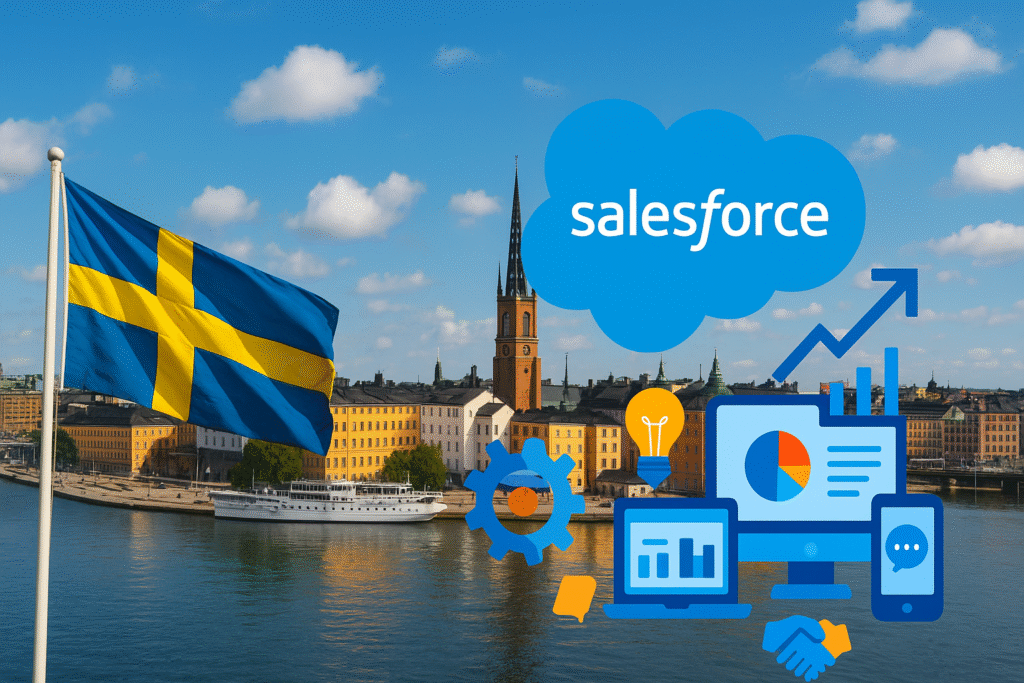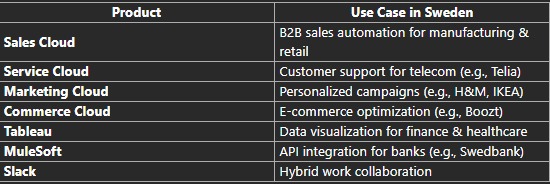Salesforce in Sweden: 2025-26 Digital Transformation with CRM

Introduction: Salesforce in Sweden
The digital transformation landscape in Sweden is evolving rapidly, with businesses increasingly adopting cloud-based Customer Relationship Management (CRM) solutions to enhance customer engagement, streamline operations, and drive growth. Salesforce, the global leader in CRM, is at the forefront of this transformation, helping Swedish enterprises across industries leverage AI, automation, and data-driven insights.
This blog explores how Salesforce is shaping Sweden’s digital future, key trends, industry-specific implementations, and the challenges businesses may face.
Table of Contents
1. Sweden Digital Transformation Landscape (2025-26)
Sweden has long been a pioneer in digital innovation, with a strong emphasis on sustainability, automation, and customer-centric business models. Key drivers of digital transformation in Sweden include:
- Government Initiatives: Sweden’s Digital Strategy 2025 focuses on AI, cybersecurity, and cloud adoption.
- High Internet Penetration: Over 98% of Swedes use the internet, making digital CRM solutions essential.
- Sustainability Goals: Swedish companies prioritize green IT, aligning with Salesforce Net Zero Cloud.
- Remote & Hybrid Work: Post-pandemic, businesses rely on cloud-based collaboration tools like Slack (now part of Salesforce).
Salesforce plays a crucial role in this ecosystem by providing scalable, AI-powered CRM solutions tailored to Sweden’s business needs.
2. Salesforce’s Growth in Sweden
Salesforce entered Sweden in 2010 and has since expanded with offices in Stockholm and Gothenburg. By 2025, Sweden will be one of Salesforce’s fastest-growing European markets, driven by:
- Increased Cloud Adoption: Over 70% of Swedish enterprises now use cloud-based CRM.
- AI & Automation Demand: Companies seek Einstein AI for predictive analytics and chatbots.
- SME & Enterprise Adoption: From startups like Klarna to giants like Volvo, Salesforce is widely used.
Key Salesforce Products in Sweden (2025-26)

3. Industry-Specific Salesforce Implementations
A. Retail & E-Commerce
Sweden’s retail sector, led by H&M, IKEA, and Boozt, uses Salesforce Commerce Cloud for:
- AI-driven product recommendations
- Omnichannel customer experiences
- Sustainability tracking (e.g., carbon footprint analytics)
B. Manufacturing & Automotive
Companies like Volvo and Scania leverage Sales Cloud & IoT integrations for:
- Predictive maintenance
- Dealer & supplier management
- Electric vehicle (EV) customer engagement
C. Financial Services
Swedish banks (SEB, Nordea, and Klarna) use Financial Services Cloud for:
- Personalized wealth management
- Fraud detection with AI
- Open banking integrations
D. Healthcare & Public Sector
Salesforce helps Swedish healthcare providers with:
- Patient data management
- Vaccination tracking
- AI-powered diagnostics (via Health Cloud)
4. Top Salesforce Trends in Sweden (2025-26)
A. Generative AI (Einstein GPT)
- AI-powered customer service (e.g., chatbots in Swedish & English)
- Automated content generation for marketing
- Predictive sales analytics
B. Hyperforce: Next-Gen Cloud Infrastructure
- Enhanced data residency compliance (GDPR)
- Faster performance for Swedish users
C. Sustainability with Net Zero Cloud
- Carbon footprint tracking
- ESG (Environmental, Social, Governance) reporting
D. Low-Code & No-Code (Salesforce Lightning)
- Faster app development for Swedish businesses
- Citizen developers in non-tech industries
E. Hybrid Work with Slack & Salesforce
- Seamless remote collaboration
- CRM-Slack integrations for sales teams
5. Challenges & Considerations
While Salesforce adoption grows, Swedish businesses face challenges:
- Data Privacy & GDPR Compliance – Ensuring customer data stays within EU regulations.
- Integration Complexity – Legacy systems may not sync easily with Salesforce.
- AI Trust & Ethics – Balancing automation with human oversight.
- Cost of Implementation – SMEs may find Salesforce expensive without proper ROI planning.
6. The Future Outlook: Salesforce in Sweden Beyond 2026
By 2026, Salesforce will likely dominate Sweden’s CRM market, driven by:
- Increased AI adoption across industries
- More industry-specific cloud solutions
- Stronger public-private partnerships for digital transformation
Sweden’s commitment to innovation ensures that Salesforce will remain a key player in the country’s digital economy.
Conclusion
Salesforce is revolutionizing Sweden digital transformation in 2025-26, empowering businesses with AI, automation, and cloud-based CRM solutions. From retail to healthcare, Swedish companies are leveraging Salesforce to enhance customer experiences, improve efficiency, and meet sustainability goals. As generative AI, Hyperforce, and Net Zero Cloud gain traction, Salesforce’s influence in Sweden will only grow. However, businesses must navigate challenges like data privacy, integration, and cost to maximize their CRM investments.

